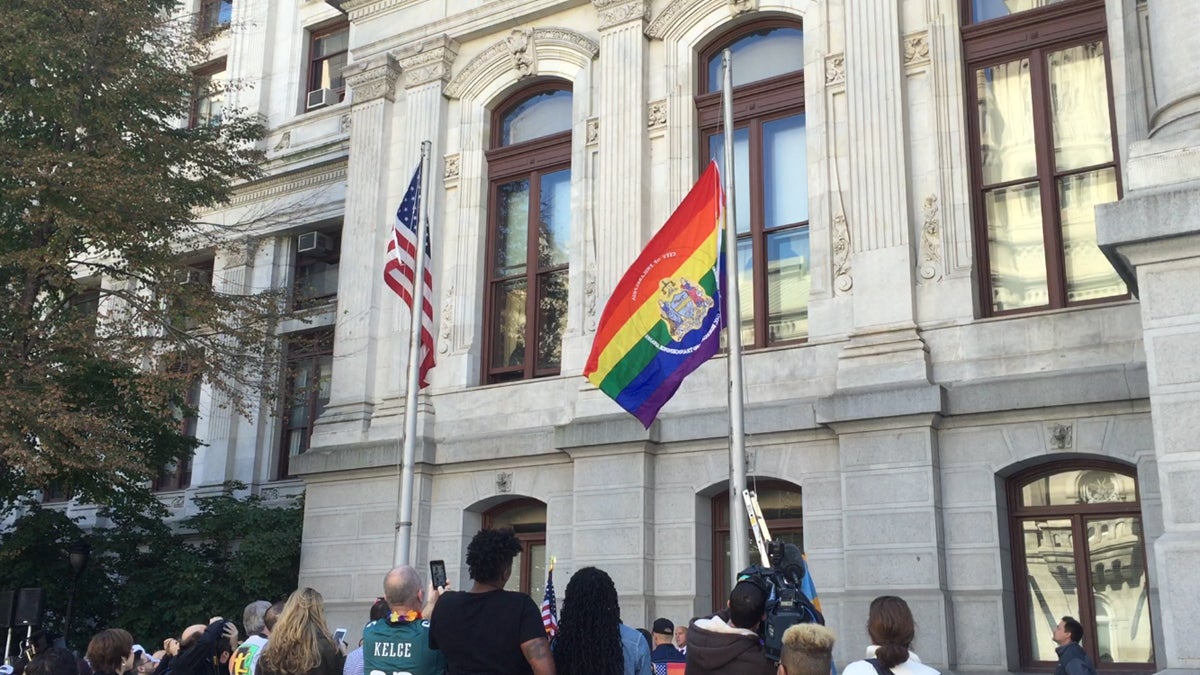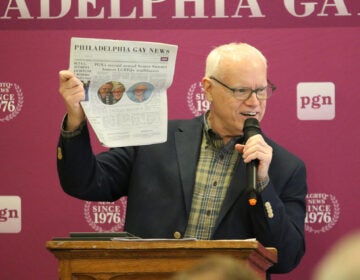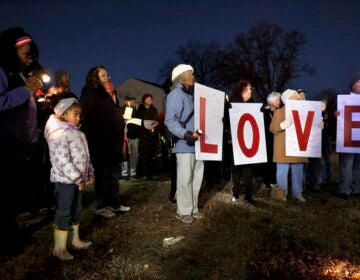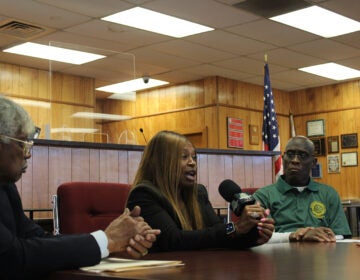Why Gayborhood racism isn’t just on Darryl DePiano

The city's pride flag is raised outside of Philadelphia City Hall in October 2015. (Eric Walter/WHYY
After the video of club owner Darryl DePiano using the n-word surfaced, he has become the de facto example of Gayborhood racism, but we know that low-key perpetrators persist.
The culture of anti-blackness as it pertains to Philadelphia’s Gayborhood doesn’t just live in the viral video of iCandy owner Darryl DePiano shamelessly uttering the n-word. It is endemic in countless traumatic experiences of black and brown LGBTQIA community members. This “receipt” for racism is just the overt manifestation of microaggressions, utter violence, and racialized policies such as the alleged “No Timbs” policy at iCandy and the reported “No athletic wear” policy of Woody’s. We as a collective know that these policies disproportionately impact black and brown communities and their ability to access these supposed safer spaces. Why did it have to take a video for the mayor’s LGBT liaison Nellie Fitzpatrick to officially name intersectionality? Why did it have to take a video for allies to listen to our experiences?
Naming intersectionality — the connection among race, class, queerness, and gender that creates overlapping and interdependent systems of discrimination — is key to disrupting structural and institutional anti-black racism. White LGBTQIA communities sometimes hold this axiom — that we are all the same in our struggle regardless of racial identity because we share trauma around sexual and gender identity oppression — which leads them to not recognize the privilege of their social position. This means that they have blind spots when it comes to racial bias, and they often are also agents of these kinds of violent acts of racism.
The failure of allyship looks like supporting the invitation of an LGBT police organization to serve as Grand Marshal for Philadelphia’s Pride Parade, which took place in June.
State-sanctioned deadly violence is enacted against a black and brown body about every 28 hours. Continuously we see hashtags, black and brown death virally shared, and the pain and grief of loved ones those ascended leave behind. This becomes part of our collective trauma as black and brown people. Which squarely places Nellie in a position of anti-blackness.
This is the same police department that has been silent about and which has obstructed the release of 911 tapes from the case of Nizah Morris, a transgender woman of color who was killed in 2002.
When Nellie was confronted by the Black and Brown Workers Collective on Wednesday, while receiving an award for her work around diversity and inclusion, she used the death of black and brown transwomen as a point of politics and tried to shame us. “Can I talk, please? The record has got to get corrected … the record is No. 1 when we are talking about intersectionality. I’d like to know where you all are when transwomen of color are being murdered in our city?” she said, as reported by Ernest Owens, the editor of G Philly who has been at the forefront of reporting on Gayborhood racism.
The chant “anti-blackness anywhere is anti-blackness everywhere” resounds loudly throughout the gayborhood in Philadelphia. A movement to disrupt and decenter whiteness is growing with great intensity in a city that is majority black and brown. In a city that is predominantly black and brown, how is it that such an imbalance of power exists? This must change!
We are calling for Nellie Fitzpatrick to resign from her position. The Black and Brown Workers Collective also wants continued and absolute divestment from anti-black establishments, which iCandy only typifies. We are building collectively with black and brown communities to cooperate and to serve our communities.
Lastly, we have an archiving campaign that centers the voices of the black and brown colonized worker, which will collect experiences and inform a qualitative research project that will culminate in a report. Louie A. Ortiz-Fonseca, founder of The Gran Varones (a multimedia project collecting the stories of Latino and Afro-Latino gay, queer, and transmen) and friend of our collective, has said recently: “What would happen if we actually believed black and Latino people? What would happen if we actually believed black trans* Latinx people in Philadelphia?”
We will elevate the voices of black and brown workers so that the value of our lives and our labor are no longer dependent on whether or not an oppressive system believes us. We are the experts of our own lives and we will define our own truths. This is a movement not a moment. It is movement time.
—
Abdul-Aliy A. Muhammad is an organizer of the Black and Brown Workers Collective. Shani Akilah is founder and an organizer of the Black and Brown Workers Collective.
WHYY is your source for fact-based, in-depth journalism and information. As a nonprofit organization, we rely on financial support from readers like you. Please give today.




